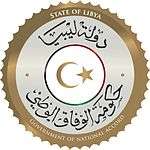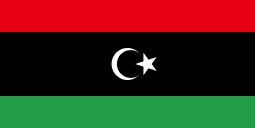Government of National Accord
 | |
| Provisional Government overview | |
|---|---|
| Formed | 2016 |
| Jurisdiction | Libya |
| Headquarters | Tripoli |
| Minister responsible | |
The Government of National Accord (Arabic: حكومة الوفاق الوطني) is an interim government for Libya that was formed under the terms of the Libyan Political Agreement which was signed on 17 December 2015.[1] The agreement has been unanimously endorsed by the United Nations Security Council which has welcomed the formation of a Presidency Council for Libya and recognized that the Government of National Accord is the sole legitimate government of Libya.[2] On 31 December 2015, Chairman of the Libyan House of Representatives, Aguila Saleh Issa declared his support for the Libyan Political Agreement.[3]
The Government of National Accord has 17 ministers and is led by Prime Minister Fayez al-Sarraj. The first meeting of the cabinet of the Government of National Accord took place on 2 January 2016 in Tunis.[4] A full cabinet consisting of 18 ministers was announced in January 2016.[5]
The Prime Minister of the GNA, Fayez al-Sarraj, and six other members of the Presidential Council and proposed cabinet arrived in Tripoli on 30 March 2016.[6] The following day, it was reported that the GNA has taken control of the prime ministerial offices.[7]
Background
Division under the GNC
 |
| This article is part of a series on the politics and government of Libya |
|
Legislature
|
|
Judiciary
|
|
|
Foreign policy |
Following the 2012 creation of the General National Congress (GNC), several factions have expressed concern with its actions. While the majority of elected officials in the GNC were moderate or liberal, the elected president, Nouri Abusahmain, as well as a strong minority of officials represented islamist parties, like the martyrs bloc and the Justice and Construction Party, causing unrest among liberals and exasperating political divides in Libya.[8] Further decisions to impose exclusionary rules that prevent those who served under Gadaffi from holding office in the GNC, to impose sharia law,[9] and to extend the mandate of the GNC another year, postponing general elections also caused dissent towards the GNC.[10] On February 14, 2014, Khalifa Haftar called for the dissolution of the GNC, and creation of a president's council that could better organize a constitution and free elections and in May he led a militia offensive called Operation Dignity which seized control Tripoli.[11]
On June 25, 2014, elections were held for the new Libya legislative body, the Council of Deputies or House of Representatives, even as Haftar's militia continued its campaign with attacks in Benghazi.[12] Moderate and liberal groups became the majority of the Council of Deputies, but because of low turnouts (estimated as low as 18% of the electorate), islamist groups rejected the results. Meanwhile islamist militias began attacks and bombings in major cities, including the assassination of Salwa Bughaighis, a women's rights activist, in Benghazi and a car bombing in al-Bayda.[13] Islamist militias soon seized control of Misrata and created its own campaign, called Operation Libya Dawn.
The results of these conflicts were a renewed civil war and a divided Libyan government, with anti-islamist groups in Tripoli, islamist groups in Misrata, and the internationally backed Council of Deputies relocated to Tobruk. As this civil war continued, efforts to create a new national unity government began.
Creation of the GNA
Efforts to mend divisions in Libya began in early 2015. On January 15, 2015, Operation Dignity forces agreed to a ceasefire with Operation Libya Dawn, while the Torbuk government agreed to talks with the Libya Dawn backed GNC, but several key members of Libya Dawn and its GNC government did not attend the planned talks in Geneva.[14] Throughout the first half of 2015, the United Nations facilitated talks between factions to draft a plans for a unity government that would bring an end to the civil war, but those proposals met resistance from all factions, with a forth draft being rejected by the Council of Deputies on June 9.[15] After continued talks throughout the remainder of 2015, a peace agreement between the two factions was signed on December 17 in Skhirat, Morocco. The agreement created a Presidential Council and the High Council of State and established the Government of National Accord. Despite bipartisan support of the agreement, both factions also had members who did not support the deal and it was feared that well-armed militias would not comply to deal.[16]
The GNA held its first meeting in Tunis on January 8, 2016,[4] had nominated ministers to all positions by February and received a vote of confidence from the House of Representatives in on March 12, 2016.[17] On March 30, 2016, the Government of National Accord moved its Presidential Council to Tripoli despite threats from militant groups in the city. The presidential council is currently operating out of a naval base in the city[18] Support for the GNA has since continued to grow. Elders from the Tuareg and Toubou peoples have expressed support for the GNA.[19]
Structure and Ministers
The Government of National Accord is codified in the Libyan Political Agreement signed in December 2016. This agreement has been unanimously endorsed by the United Nations Security Council which has recognized that the Government of National Accord is the sole legitimate government of Libya.[2][20] The Libyan Political agreement gives executive authority to the GNA, while leaving legislative authority to the House of Representatives as it was following the June 2014 elections. It also establishes the High Council of State, a consultative body independent of GNA.
The Government of National Accord under the Libyan Political Agreement comprises a cabinet of ministers and a presidency council. The cabinet of the Government of National Accord has 17 ministers and is led by Prime Minister Fayez al-Sarraj and two Deputy Prime Ministers. The Prime Minister is also the chair of the Presidential Council. Ministers in the cabinet need to be unanimously approved by the Prime Minister and his deputies and ministers can likewise only be removed with a unanimous decision of the Prime Minister and his deputies.[21]
The Government of National Accord is granted one year term from the date the House of Representatives grants it a vote of confidence, but this term will be automatically extended an additional year if a new constitution is not completed and implemented during the term. The GNA can also be dissolved by a vote of no confidence from the House of Representatives, or by the death, vacancy, or resignation of the Prime Minister.[21]
The following ministers were proposed in January 2016:[4][5][22]
| Incumbent | Office | Former allegiance | Website | Since | Until |
|---|---|---|---|---|---|
| Fayez al-Sarraj | Prime Minister of Libya | www.pm.gov.ly | |||
| Ahmed Maiteeq [23] | Deputy Prime Minister | ||||
| Musa Al-Koni [24] | Deputy Prime Minister | ||||
| Fathi Al-Mijabri [23] | Deputy Prime Minister | ||||
| Fakhr Muftah Bufernah | Minister of Finance | www.mof.gov.ly | June 30, 2016[25] | ||
| Juma Abdullah Drissi | Minister of Justice | www.aladel.gov.ly | June 30, 2016[25] | ||
| Omar Bashir Al-Taher | Minister of Health | www.health.gov.ly | |||
| Al-Aref al-Khoga | Minister of Interior | Libya Dawn | www.moi.gov.ly | ||
| Mohamed Khalifa Al-Azzabi | Minister of Education | www.edu.gov.ly | |||
| Mohamed Taha Siala | Minister of Foreign Affairs | www.foreign.gov.ly | |||
| Al-Mahdi Al-Barghathi | Minister of Defense | Council of Deputies | www.defense.gov.ly | ||
| Al-Hadi Al-Taher Al-Juhaimi | Minister Planning | www.planning.gov.ly | |||
| Faida Mansour El-Shafi | Minister of Social Affairs | www.socialaffairs.gov.ly | |||
| Abdulmutaleb Ahmed Abu Farwa | Minister of Economy & Industry | www.industry.gov.ly | June 30, 2016[25] | ||
| Ali Galma Mohamed | Minister of Labour | www.labour.gov.ly | |||
| Asma Mustafa Usta | Minister of State for Women’s Affairs and Development | ||||
| Muhannad Said Younis | Minister of State for Martyrs, Wounded and Missing | ||||
| Iman Mohammed Ben Younes | Minister of State for Institutional Reform | ||||
| Abdeljawad Faraj Al-Obaidi | Minister of State for National Reconciliation | June 30, 2016[25] | |||
| Yousef Abubakr Jalalah | Minister of State for Migrants and Displaced | ||||
See also
References
- ↑ "As Libya marks 64th independence anniversary, UN envoy urges unity behind new Government". United Nations. 24 December 2015. Archived from the original on 27 January 2016.
- 1 2 "Unanimously Adopting Resolution 2259 (2015), Security Council Welcomes Signing of Libyan Political Agreement on New Government for Strife-Torn Country". United Nations. 23 December 2015. Archived from the original on 30 January 2016.
- ↑ Zaptia, Sami (1 January 2016). "Ageela Salah now supports UN-brokered Skhirat agreement: Kobler". Libya Herald. Archived from the original on 24 February 2016.
- 1 2 3 Zaptia, Sami (2 January 2016). "Serraj holds GNA meeting in Tunis". Libya Herald. Archived from the original on 27 January 2016.
- 1 2 "Libya rivals announce unity government as part of UN-backed plan". The Guardian. 19 January 2016. Archived from the original on 28 January 2016.
- ↑ "Support grows for Libya's new unity government". Mail Online. 1 April 2016. Retrieved 27 April 2016.
- ↑ https://www.libyaherald.com/2016/03/31/rebel-tripoli-administration-vanishes-ghwell-flees-to-misrata/
- ↑ Eljarh, Mohamed. "Can the New Libyan President Live Up to Expectations?". Foreign Policy. Retrieved 23 November 2016.
- ↑ "Libyan assembly votes to follow Islamic law". Reuters. Reuters. 4 December 2016. Retrieved 23 November 2016.
- ↑ "Libya congress extends its mandate until end-2014 | Middle East Institute". www.mei.edu. Middle East Institute. Retrieved 23 November 2016.
- ↑ Anderson, Jon Lee. "Libya's New Strongman". The New Yorker. Retrieved 23 November 2016.
- ↑ "Libyans vote for new parliament". www.aljazeera.com. Al Jazeera. Retrieved 23 November 2016.
- ↑ "Libyans mourn rights activist amid turmoil". www.aljazeera.com. Retrieved 23 November 2016.
- ↑ Bosalum, Feras; Elumami, Ahmed (16 January 2017). "Libya parties agree to more talks; two factions call ceasefire". Reuters. Retrieved 23 November 2016.
- ↑ "Libya's parliament rejects U.N. peace proposal". english.alarabiya.net. Al Arabiya. Retrieved 23 November 2016.
- ↑ "Rival Libyan factions sign UN-backed peace deal". www.aljazeera.com. Retrieved 23 November 2016.
- ↑ "Libyan unity government moves to take power, asserting sole authority to rule". The Guardian. 12 March 2016. Retrieved 27 November 2016.
- ↑ "Libya's UN-backed government sails into Tripoli". www.aljazeera.com. Al Jazeera. Retrieved 27 November 2016.
- ↑ "Tabu and Tuareg announce their support for GNA | Libya Prospect". libyaprospect.com. Retrieved 27 November 2016.
- ↑ prospect, lib. "PC announces 18 members unity government - Libya Prospect". Retrieved 27 November 2016.
- 1 2 "The Libya Political Agreement" (PDF). Retrieved 27 November 2016.
- ↑ lib prospect. "PC announces 18 members unity government". Retrieved 27 April 2016.
- 1 2 "New divisions come forth as rival parliaments unite against 'imposed' Libya government". MaltaToday.com.mt. Retrieved 27 April 2016.
- ↑ "Readout of the Secretary-Generals meeting with the Deputy Prime Minister of the Libyan Government of National Accord Mr. Mousa Al Kony". menafn.com. March 29, 2016. Retrieved August 2, 2016.
- 1 2 3 4 "Libya's unity government suffers blow as four ministers resign". Middle East Eye. Retrieved 22 November 2016.
External links
- Government of National Accord- Official website
- Government of National Accord - Official Facebook profile
- Government of National Accord - Official Twitter feed